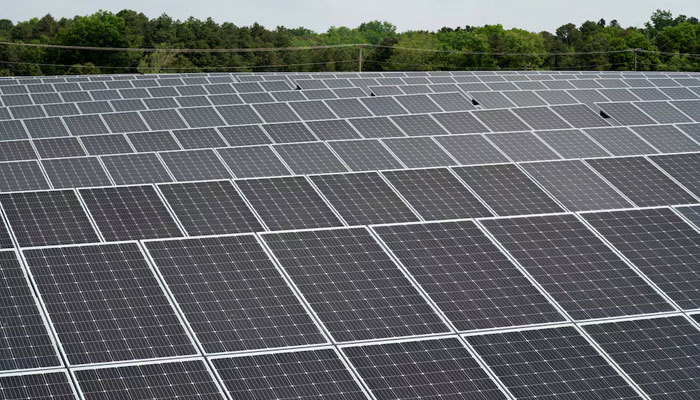Equitable energy access for all emphasised amid solar surge
Islamabad:The rapid growth of rooftop solar systems is transforming Pakistan's energy landscape but also creating disparities for lower-income electricity consumers who remain dependent on the traditional grid. To address this, ensuring equitable energy access for all consumers is crucial.
This was the main point highlighted by experts during a discussion on ‘Navigating the Solar Surge: Ensuring Equitable Energy Access in Pakistan's Power Sector,’ at the Institute of Policy Studies (IPS) here on Thursday. IPS research officer Wali Farooqui pointed out that while falling solar costs had led to its mass adoption, it was mostly elite consumers benefiting from these savings.
"This shift is creating a two-tiered energy system, where those who cannot afford solar are at an increasing disadvantage, burdened with higher bills. Those with higher-paying capabilities can shield themselves from rising electricity prices, but leaves lower-income consumers worse off as they are left facing a greater share of the grids costs,” he said. IPS chairman Khalid Rahman emphasised that the lack of timely amendments to net metering policies was exacerbating those inequities.
He called for more inclusive policy development that ensures both solar adopters and grid-dependent consumers are treated fairly. "Without assessing these changes and their broader impacts, we risk harming the majority of consumers," he said. Energy advocate Ameena Sohail warned unchecked solar growth could place on grid operations.
She called for a reassessment of Pakistan’s energy generation planning to prioritise solar integration without jeopardising the financial and operational stability of the grid. Renewable energy expert Asad Mahmood said while solar adopters benefited from significantly lower bills, many consumers were left facing increased economic pressure.
He emphasised the need for clear regulations to determine how much solar the grid can handle, ensuring that its expansion doesn’t disadvantage those still reliant on traditional energy sources.
Head of energy and sustainability at Amreli Steels Abubakar Ismail said while renewable energy and decarbonisation were universally supported, maintaining a reliable energy supply required continuous power, even when solar generation was not available. He warned that without policy and regulatory frameworks, the escalating shift towards solar could lead to imbalances in grid stability, potentially leading to a “duck curve” scenario in the next two years or so.
CEO of Siddique Renewable Energy Muhammad Musaddiq called for addressing the environmental damage caused by fossil fuels and said adoption of electric vehicles and solar energy would rise, posing challenges for power plants. Former water and power secretary Mirza Hamid said while solar energy adoption was vital for the country's energy future, it was equally important to ensure that the costs of maintaining the grid were fairly distributed. He advocated for a fair grid cost to be transferred onto net metering consumers so that those relying on the grid were not unfairly burdened.
-
 18-month Old On Life-saving Medication Returned To ICE Detention
18-month Old On Life-saving Medication Returned To ICE Detention -
 Cardi B Says THIS About Bad Bunny's Grammy Statement
Cardi B Says THIS About Bad Bunny's Grammy Statement -
 Major Hollywood Stars Descend On 2026 Super Bowl's Exclusive Party
Major Hollywood Stars Descend On 2026 Super Bowl's Exclusive Party -
 Sarah Ferguson's Silence A 'weakness Or Strategy'
Sarah Ferguson's Silence A 'weakness Or Strategy' -
 Garrett Morris Raves About His '2 Broke Girls' Co-star Jennifer Coolidge
Garrett Morris Raves About His '2 Broke Girls' Co-star Jennifer Coolidge -
 Winter Olympics 2026: When & Where To Watch The Iconic Ice Dance ?
Winter Olympics 2026: When & Where To Watch The Iconic Ice Dance ? -
 Melissa Joan Hart Reflects On Social Challenges As A Child Actor
Melissa Joan Hart Reflects On Social Challenges As A Child Actor -
 'Gossip Girl' Star Reveals Why She'll Never Return To Acting
'Gossip Girl' Star Reveals Why She'll Never Return To Acting -
 Chicago Child, 8, Dead After 'months Of Abuse, Starvation', Two Arrested
Chicago Child, 8, Dead After 'months Of Abuse, Starvation', Two Arrested -
 Travis Kelce's True Feelings About Taylor Swift's Pal Ryan Reynolds Revealed
Travis Kelce's True Feelings About Taylor Swift's Pal Ryan Reynolds Revealed -
 Michael Keaton Recalls Working With Catherine O'Hara In 'Beetlejuice'
Michael Keaton Recalls Working With Catherine O'Hara In 'Beetlejuice' -
 King Charles, Princess Anne, Prince Edward Still Shield Andrew From Police
King Charles, Princess Anne, Prince Edward Still Shield Andrew From Police -
 Anthropic Targets OpenAI Ads With New Claude Homepage Messaging
Anthropic Targets OpenAI Ads With New Claude Homepage Messaging -
 US Set To Block Chinese Software From Smart And Connected Cars
US Set To Block Chinese Software From Smart And Connected Cars -
 Carmen Electra Says THIS Taught Her Romance
Carmen Electra Says THIS Taught Her Romance -
 Leonardo DiCaprio's Co-star Reflects On His Viral Moment At Golden Globes
Leonardo DiCaprio's Co-star Reflects On His Viral Moment At Golden Globes




